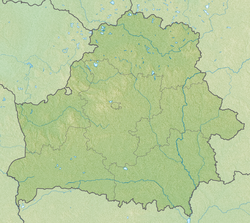| Cold Synagogue | |
|---|---|
Yiddish: די קאַלטע שול | |
 The former synagogue, in 1913 | |
| Religion | |
| Affiliation | Judaism (former) |
| Ecclesiastical or organisational status | Synagogue (1680–1938) |
| Status | Destroyed |
| Location | |
| Location | Mogilev, Mogilev Region |
| Country | Belarus |
Location of the destroyed synagogue in Belarus | |
| Geographic coordinates | 53°53′34″N 30°19′56″E / 53.89278°N 30.33222°E |
| Architecture | |
| Type | Synagogue architecture |
| Style | Wooden |
| Completed | 1680 |
| Destroyed | 1938 |
| Materials | Timber |
The Cold Synagogue or Školišča Synagogue (Yiddish: די קאַלטע שול, Belarusian: Халодная сінагога на Школішчы) was a synagogue located near the intersection of Vyalikaja Hramadzianskaya (now Grażdanskaya) and Pravaya Naberezhnaya Streets, in Mogilev, Belarus.
The wooden synagogue was established in c. 1680, sited adjacent to a cheder. The interior was almost entirely covered with magnificent polychromes made in 1740s by the Słuck painter, Chaim ben Yitzchak ha-Levi Segal. In the beginning of the 20th century, several ethnographic expeditions, by Alexander Miller, S. An-sky and Solomon Yudovin, and by El Lissitzky and Issachar Ber Ryback documented and photographed interiors of the synagogue. After the article by Lissitzky, interior murals of the synagogue became quite famous in artistic circles. It was decided by the state authorities in 1918 that the synagogue was covered by legal protection. However, the synagogue was closed in 1938 and then dismantled by government authorities. The photos, drawings, and article by El Lissitzky is almost all evidence that preserved.
